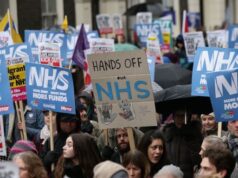Support for Children’s Health and Wellbeing Continues to Deteriorate in Ealing
On 1 July 2015, Ealing future would-be parents suffered the closure of Ealing Hospital’s Maternity Unit. On 30 June 2016, Ealing Hospital’s Paediatric services were withdrawn, along with the closure of the children’s A&E unit in the hospital. Anecdotaly, concerned parents still arrive in the middle of the night with seriously ill children only to discover to their horror that A&E specialist support for children no longer exists at the hospital.
On 6 July 2019 Ealing Council decided to close the Children’s Centres at Wood End and North Ealing. The annual budgets of 11 other Children’s Centres in Ealing were cut by 24%. Apparently, the Council insists that the level of midwifery, health visitor and other specialist services for children will be unaffected. Some parents will take this insistence with more than a little pinch of salt.
Are the Goals for Primary Care Networks a Case of ‘Mission Impossible’ or ‘Mission Irrelevant’?
As part of NHSE’s Long Term Plan published in January 2019, about 1,000 Primary Care Networks (PCNs) have been set up and are now in operation across England, with 76 of them in north west London. There are eight PCNs in Ealing, each PCN between 5 and 15 GP practices, and each handling between 36,661 and 77,731 patients. For each PCN a Clinical Director has been appointed. PCNs are not statutory bodies.
But what problems are PCNs supposed to fix? Apparently PCNs will bring General Practices together to work ‘at scale’. What exact problem or problems will this togetherness solve? No real clarity on that one from NHSE. As for ‘at scale’ I can only presume that in this context this means handling larger volumes of patients (presumably more efficiently and more quickly) than is the case currently.
Simplistically though, only many more GPs and Practice Nurses will facilitate handling larger volumes of patients (with hopefully reduced waiting times). And unless we all get much healthier or doctors/medicines/Primary Care treatments improve radically, with more GPs handling more patients we’ll need more hospital beds, consultants, operating theatres, psychologists, ICUs, A&E units etc, etc.
The PCN approach tries to negotiate the current and likely future shortage of GPs by offering cash inducements for GPs, via their PCN, to gain shared access to other kinds of healthcare professionals – initially pharmacists and physiotherapists. Another cited reason for PCNs is to enable the integration of Primary Care with other services. The track record of attempts to integrate healthcare and social care services in England however is strewn with failures. It’s suggested that with each PCN Clinical Director sitting on the new Ealing Integrated Care parthership (ICP) – in 2020 or 2021 – that this will somehow help to enable integration. The final NHSE PCN justification is ‘to improve population health’. How this might be achieved is not spelled out and is quite frankly an unsupportable claim.
NHSE’s ambitions for PCNs are quite breath-taking. PCNs are expected to deliver co-ordinated health and social care. This will involve co-ordinating local government, community pharmacies, dental providers, social care providers, mental health staff, hospitals, dementia workers, podiatrists/chiropodists, voluntary sector organisations and community service providers. Each PCN will hire (fire), manage and somehow share the following staff around its network of GP surgeries – clinical pharmacists, physiotherapists, Social Prescribing Link Workers (SPLWs), physician associates and paramedics. SPLWs, by the way, aim to connect people to community groups and statutory non-clinical services for practical and emotional support. Maybe they are what in the 1960s we called social workers.
As from April 2020, PCNs will provide structural medication reviews and optimisation; enhanced health in care homes; anticipatory care; personalised care; and supporting cancer diagnosis. As from April 2021, PCNs will deliver cardiovascular disease diagnosis and prevention, and locally agreed action to tackle inequalities.
PCN funding seems to be either ‘by April 2021’ or ‘by 2023/24’. It’s £1.8 billion over five years. 70% of the cost of hiring specific new clinical staff will be provided by NHSE. This 70% funding will commence this financial year with clinical pharmacists. SPLWs can be 100% funded right now by NHSE.
PCNs will need more than just a Clinical Director to handle personnel, financial, management and recruitment duties – as well as functioning as a GP. Is there money from NHSE to run this small PCN business? 0.25% of a person apparently. It seems inadequate. In the Acton PCN in Ealing, 15 GP surgeries are supposedly working together to collectively provide Primary Care for a registered patient population of 77,731. (This is a larger population than that of Macclesfield, Maidenhead, or Scarborough). Running this lot is akin to running quite a large small business.
According to a survey carried out by ‘GPonline’ in May 2019, 48% of GP practice partners think PCNs will increase workload amid fears of rising bureaucracy.
NHS NWL Gets £ZERO To Plug its £739+ Million NHS North West London Hospital Repair Backlog – in Johnson’s £850 Million Pre-Brexit Give-Away
El Presidente Johnson announced on 5 August 2019 his first pre-Brexit ‘give-away’ to selected NHS Trusts and CCGs. 20 NHS bodies throughout England will receive £850 million for building work. However the NHS North West London (NWL) region (or ‘Footprint’ in NHSE speak) with the largest repairs backlog will receive zero funds. To refresh your eyes and minds with some of these repair bills as reported in the ‘Sunday Times’ on 10 February 2019, they were:
+ Charing Cross Hospital: £312 million
+ St Mary’s Hospital: £229 million
+ Hammersmith Hospital: £108 million
+ Hillingdon Hospital: £80 million.
Why do I think NHS NWL has been given no cash whatsoever? Here is my take on it:
- Could it be that there are just too few Conservative MPs ‘at risk’ in NWL. There’s only Bob Blackman MP in Harrow East. As for Labour MPs virtually all of them hold healthy majorities. The only exception to this is Labour MP Emma Dent Coad in Kensington.
- NHS NWL’s appalling profligacy with money in recent years probably does not endear it to NHSE. Over £70 million wasted on management consultants since 2009 and up to £1.3 billion frittered away irresponsibly over seven years on the always flawed ‘Shaping a Healthier Future’ project. Using the NHSE debt accounting regime, seven of the eight CCGs are seriously in debt and all seven NHS Hospital Trusts are also in deficit. The total NHS NWL deficit, according to an anonymous whistle-blower is £324 million.
- NHSE still covertly wants to demolish one/some of the existing seven Major Hospitals in the NWL region.
Beware of Geeks Bearing Gifts!
Artificial Intelligence (AI) is a barely 70 year old branch of computer software. AI is often simplisticly linked to robots (who, allegedly, might kill all humans and run the world ). However the mundane truth is that the best AI can offer now and within the medium term future is useful ‘decision support’ information to healthcare professionals.
AI might be able to predict a diagnosis or treatment protocol extremely precisely, but it can’t, intrinsically, tell a doctor, nurse (or patient) the cause of or reason for a medical condition. An AI algorithm (piece of software) is only as ‘right’ as its design. If the sotware designer gets it ’wrong’ then the AI algorithm will consistently get it wrong over and over again. This amounts to ‘Artificial Ignorance’.
Of course it’s very fashionable these days to support and eulogise about AI. Our new Prime Minister and our Secretary of State for Health and Social Care are literally gushing about it. President Johnson on 7 August 2019 threw £250 million at an NHS AI laboratory. Press reports quote how this investment would improve cancer screening and identify patients most at risk from heart disease and dementia. These are credible claims. However the claim that this investment in AI will ’end bed blocking’ has no credibility at all.
Climate Change is Now the Excuse for Disastrous A&E Performance in July 2019
In July 2019, no London NHS hospital met the NHS A&E 95% target for ward admission, transfer or discharge within four hours. Kings College Hospital was the worst performer at 73.6%. Apparently nationally in July 2019 A&E admissions were up year by year by 4.6%. Apparently the weather was responsible for increased admissions and poor performance.
The reality in NHS North West London is that hospitals have been underfunded for years, two hospital A &E units were closed down in September 2014 and two other hospital A&E units have had the real threat of closure hanging over them for seven years.
The chronic shortage of doctors, nurses and mental health staff is a national disgrace. No amount of NHS money for hospital repairs or AI will directly help to fund, hire and train more NHS doctors and nurses.
NHSE Paid $226 Billion US Healthcare Giant £7 million to ‘Help’ CCGs Cut Costs, Integrate Their Care Systems and Embrace Accountable Care
UnitedHealth Group, in association with management consultants PriceWaterhouseCoopers (PwC), was last year paid £7 million by NHS England (NHSE) to help 55 Clinical Commissioning Groups (CCGs) cut their costs. The turnover of UnitedHealth last year was $226 billion. Simon Stephens, the boss of NHSE, knows the company very well as he’s a former President of UnitedHealth Europe.
The Optum Alliance (UnitedHealthcare and PwC) have been acting as ‘programme coach‘ (US management consultancy jargon) to, for example, Harrow CCG. The alliance has extolled the virtues of ‘demand management’ (in simple language restricting care service supply) with specific targeting of restricting unplanned hospital admissions. The alliance has also been proselytising about US-style Accountable Care. Central tenets of the Accountable Care shibboleth involve financial incentives to improve ‘performance’ and cost control.
Thanks to Calderdale and Kirklees 999 Call the NHS for spotting this NHSE ‘investment’.
Friarage Hospital A&E Closure: NHS Bosses Get Cold Feet After Campaigners Mount Judicial Review
A&E services at Friarage NHS Hospital in North Allerton, South Yorkshire were closed in March 2019. Local campaign group ‘Save Friarage Hospital’ mounted a challenge to this and began Judicial Review proceedings. In July 2019 NHS bosses (Trust and CCG) announced there would be a full consultation into services at the hospital. As a consequence, the campaign group has shelved legal action.




